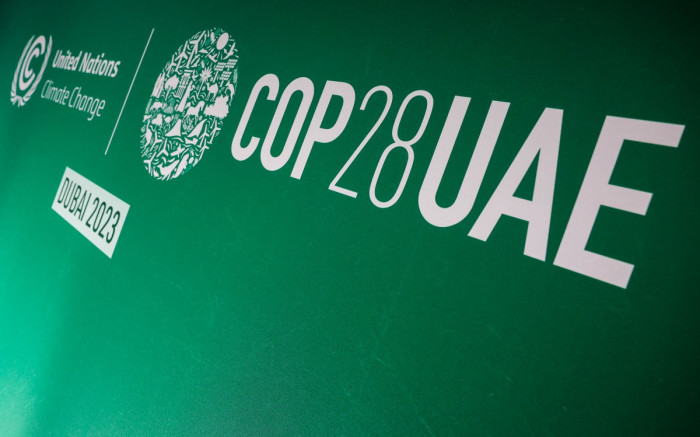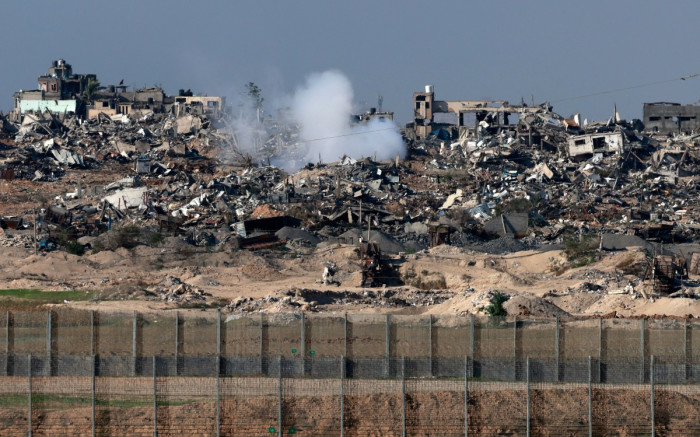
Environmental activists say there is no longer any doubt that urgent collective action is needed to maintain a livable planet.
A COP28 logo is pictured ahead of the UN climate summit in Dubai on November 28, 2023. Image: AFP
WASHINGTON, USA – Deadly floods in the Horn of Africa. Summer wildfires that devastated Canadian forests. Global temperature records, unprecedented in human history.
Environmental activists say there is no longer any doubt that urgent collective action is needed to maintain a livable planet. As the United Nations (UN) COP28 climate talks begin in Dubai on Thursday, here are five things to watch out for.
THE ENERGY TRANSITION
All eyes are on the language that leaders will adopt regarding the transition from fossil fuels to renewable energy – crucial to limiting long-term warming to 1.5 degrees Celsius, as envisaged in the Paris Agreement.
At COP26 in Glasgow in 2021, countries agreed to “phase out” “unabated coal power”. Since then, momentum has increased among governments and activists to extend similar ideas to oil and gas, although the exact wording has yet to be worked out.
Expectations are high for voluntary commitments to triple renewable energy capacity by 2030, a goal endorsed by the United States and China in a recent climate statement, as well as doubling the annual rate of improvement in energy efficiency.
Ideally, the commitments should come in the form of an official response to the Global Stocktake, a damning report released in September that highlighted how little the world has done to address the crisis.
MAKE “LOSS AND DAMAGE” A REALITY
A major breakthrough at COP27 in Sharm El-Sheikh, Egypt, was an agreement in principle to compensate climate-vulnerable countries that are least responsible for greenhouse gas emissions and face increasing severe weather impacts.
But operationalizing a new fund proved complicated as negotiations dragged on for over a year. Among the questions that needed to be answered was: Will all countries pay or just the rich? Who will be the recipients? Where should the fund be housed?
A fragile agreement was reached in early November and COP28 President Sultan Ahmed Al Jaber told AFP in a recent interview that he hoped a decision would be made at the start of the conference.
THE CLIMATE FINANCE GAP
Expert groups estimate that the world will need more than $3 trillion in climate-related inflows annually by 2030 to maintain climate goals – but so far developing countries have fallen well short of expectations, both in terms of accelerating decarbonization and Mitigation also refers to building resilience to climate impacts, known as adaptation.
In 2009, richer countries pledged to provide $100 billion in funding annually to these priorities by 2020, a goal that was finally met in 2022, according to an OECD report earlier this month.
COP28 is expected to lay the groundwork for a new funding target, replacing the old $100 billion target, although parties are not required to make a decision in 2023.
It could also provide an opportunity to better define and implement Clause 2.1(c) of the Paris Agreement, which calls for “balancing financial flows with a path to low greenhouse gas emissions and climate-resilient development.”
METHANE AND FOOD SYSTEMS
Atmospheric methane is the second largest contributor to climate change, but has received relatively little attention compared to carbon dioxide despite its strong warming effects.
China, the United States and the United Arab Emirates will jointly hold a summit on methane and non-CO2 greenhouse gases as part of the talks, which could strengthen a 2021 Global Methane Pledge to curb emissions by Reduce by 30 percent by 2030.
COP28 will also be the first conference of its kind to focus on food systems, which are responsible for a third of human-caused greenhouse gases, with severe weather and droughts also threatening food production and transport.
Another first: a summit with hundreds of “subnational” leaders such as mayors and governors.
Around 70% of the world’s population is expected to call cities home by 2050, and greater participation in climate action is seen as crucial, especially if national governments hold back progress.






Recent Comments